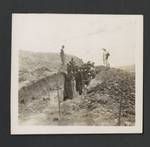Rural electrification in Papua New Guinea : an assessment of a pilot micro-hydroelectricity project
- Description:
- The study presented here is an investigation of rural electrification in Papua New Guinea using a case method approach. The case study rural electricity scheme is a two-stage pilot micro- hydroelectricity project located in the remote Nabak Region of Morobe and known as the Umbang-Baindoang project. Both stages of the project are described and their short-term socio-economic impacts are assessed and compared with the likely impacts of other rural development projects with which they were competing. The planning and management aspects of the ...
- Display date:
- 2017
- Location:
- Papua New Guinea
- Format:
- thesis(phd)
- Collections:
- Australian National University Library
- Content partner:
- Australian National University Library
- Availability:
- Not specified
-
Copyright status: All rights reservedFind out more about what you are able to do with this itemThis item is all rights reserved, with means you'll have to get permission from Australian National University Library before using it. For more information, please see our use and reuse page.What can I do with this item?Non-infringing useNZ copyright law does not prevent every use of a copyright work, and this item may be hosted by an international institute or organisation. You should consider what you can and cannot do with a copyright work.No sharingYou may not copy and/or share this item with others without further permission. This includes posting it on your blog, using it in a presentation, or any other public use.No modifyingYou are not allowed to adapt or remix this item into any other works.No commercial useYou may not use this item commercially.
Related items
Welcome and warm Pasifik greetings
The information on this site has been gathered from our content partners.
The names, terms, and labels that we present on the site may contain images or voices of deceased persons and may also reflect the bias, norms, and perspective of the period of time in which they were created. We accept that these may not be appropriate today.
If you have any concerns or questions about an item, please contact us.

